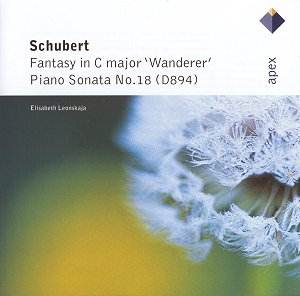Elisabeth Leonskaja is an intrinsically musical player,
but one who impresses most live. In the studio her performances can
fall short of the highest standards, even if they sporadically display
her undoubted affinity for her chosen composers.
The present disc, a straight reissue of a Teldec disc
from the late eighties, has much to recommend it on its own virtues.
Chording is always carefully weighted and voice-leading can be exquisitely
delineated. But it requires a player of greater insight to convey the
timeless, almost mystical qualities which lie dormant within Schubert’s
mature piano oeuvre and for a true reflection of this the purchaser
is forced to look elsewhere. The transition to the Adagio of the Wanderer
is a case in point: far too literal, the opening chords of the slow
section hardly carry the emotive weight they are due. A tendency to
dwell too much in the contrasting sections of the Presto is unfortunately
reflected in the carefully executed Finale.
The engineer, Eberhard Sengpiel, has given the piano
a rather harsh sound. Pollini, also, is captured in a brittle atmosphere,
but his grasp of Schubert is vastly superior (DG 447 451-2).
The G major Sonata, D894, poses multiple challenges
for the interpreter. The extended first movement (here over twenty minutes)
can become leaden if the concentration is allowed to sag (the marking
is ‘Molto moderato e cantabile’). Leonskaja’s tonal variety is insufficient
to maintain interest throughout, mainly because she cannot project the
requisite atmosphere of transcendent calm. The whole sonata continues
in the same vein: Schubert’s remaining tempo markings are Andante, Allegro
moderato and Allegretto, and although Leonskaja achieves echt-Schubertian
simplicity at times and provides a characterful finale, it is not enough
to lift the listening experience above the merely adequate.
Unfortunately, even at super-budget price this disc
does not offer enough to be recommendable.
Warner’s presentation is, as always with the Ultima series, minimal, but
at least recording details of date, producer and engineer are included.
The programme notes are uncredited, but whoever wrote them refers to Schubert
as ‘a master of the opera’
Colin Clarke


